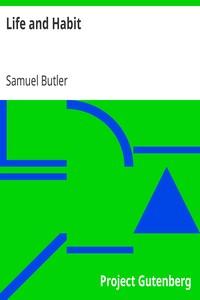Read this ebook for free! No credit card needed, absolutely nothing to pay.
Words: 86181 in 15 pages
This is an ebook sharing website. You can read the uploaded ebooks for free here. No credit cards needed, nothing to pay. If you want to own a digital copy of the ebook, or want to read offline with your favorite ebook-reader, then you can choose to buy and download the ebook.


: Life and Habit by Butler Samuel Streatfeild R A Richard Alexander Contributor - Evolution; Life (Biology); Habit
Edition: 10
LIFE AND HABIT
PREFACE Since Samuel Butler published "Life and Habit" thirty-three years have elapsed--years fruitful in change and discovery, during which many of the mighty have been put down from their seat and many of the humble have been exalted. I do not know that Butler can truthfully be called humble, indeed, I think he had very few misgivings as to his ultimate triumph, but he has certainly been exalted with a rapidity that he himself can scarcely have foreseen. During his lifetime he was a literary pariah, the victim of an organized conspiracy of silence. He is now, I think it may be said without exaggeration, universally accepted as one of the most remarkable English writers of the latter part of the nineteenth century. I will not weary my readers by quoting the numerous tributes paid by distinguished contemporary writers to Butler's originality and force of mind, but I cannot refrain from illustrating the changed attitude of the scientific world to Butler and his theories by a reference to "Darwin and Modern Science," the collection of essays published in 1909 by the University of Cambridge, in commemoration of the Darwin centenary. In that work Professor Bateson, while referring repeatedly to Butler's biological works, speaks of him as "the most brilliant and by far the most interesting of Darwin's opponents, whose works are at length emerging from oblivion." With the growth of Butler's reputation "Life and Habit" has had much to do. It was the first and is undoubtedly the most important of his writings on evolution. From its loins, as it were, sprang his three later books, "Evolution Old and New," "Unconscious Memory," and "Luck or Cunning", which carried its arguments further afield. It will perhaps interest Butler's readers if I here quote a passage from his note-books, lately published in the "New Quarterly Review" , in which he summarizes his work in biology:
"To me it seems that my contributions to the theory of evolution have been mainly these
"1. The identification of heredity and memory, and the corollaries relating to sports, the reversion to remote ancestors, the phenomena of old age, the causes of the sterility of hybrids, and the principles underlying longevity--all of which follow as a matter of course. This was 'Life and Habit' .
"2. The re-introduction of teleology into organic life, which to me seems hardly, if at all, less important than the 'Life and Habit' theory. This was 'Evolution Old and New' .
"3. An attempt to suggest an explanation of the physics of memory. This was Unconscious Memory' . I was alarmed by the suggestion and fathered it upon Professor Hering, who never, that I can see, meant to say anything of the kind, but I forced my view upon him, as it were, by taking hold of a sentence or two in his lecture, 'On Memory as a Universal Function of Organised Matter,' and thus connected memory with vibrations.
"What I want to do now is to connect vibrations not only with memory but with the physical constitution of that body in which the memory resides, thus adopting Newland's law that there is only one substance, and that the characteristics of the vibrations going on within it at any given time will determine whether it will appear to us as, we will say, hydrogen, or sodium, or chicken doing this, or chicken doing the other." .
One more point deserves notice. Butler often refers in "Life and Habit" to Darwin's "Variations of Animals and Plants under Domestication." When he does so it is always under the name "Plants and Animals." More often still he refers to Darwin's "Origin of Species by means Natural Selection," terming it at one time "Origin of Species" and at another "Natural Selection," sometimes, as on p. 278, using both names within a few lines of each other. Butler was as a rule scrupulously careful about quotations, and I can offer no explanation of this curious confusion of titles.
R. A. STREATFEILD. November, 1910.
The Italics in the passages quoted in this book are generally mine, but I found it almost impossible to call the reader's attention to this upon every occasion. I have done so once or twice, as thinking it necessary in these cases that there should be no mistake; on the whole, however, I thought it better to content myself with calling attention in a preface to the fact that the author quoted is not, as a general rule, responsible for the Italics.
S. BUTLER. November 13, 1877.
Free books android app tbrJar TBR JAR Read Free books online gutenberg
More posts by @FreeBooks

: The Home of the Blizzard Being the Story of the Australasian Antarctic Expedition 1911-1914 by Mawson Douglas Sir - Antarctica Discovery and exploration; Australasian Antarctic Expedition (1911-1914)


: Bars and Shadows: The Prison Poems of Ralph Chaplin by Chaplin Ralph Nearing Scott Author Of Introduction Etc - Imprisonment Poetry; Prisoners' writings American; Prisons United States Poetry






